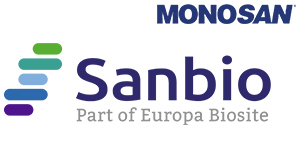Anti-Annexin A1/ANXA1 Antibody Picoband™ (monoclonal, 6B7F8)
Anti-Annexin A1/ANXA1 Antibody Picoband™ (monoclonal, 6B7F8)
SKU
SANMON23908
Packaging Unit
100μg
Manufacturer
Sanbio / Monosan
Availability:
loading...
Price is loading...
Clone Number: 6B7F8
Immunogen: E.coli-derived human Annexin A1 recombinant protein (Position: A2-N346). Human Annexin A1 shares 88% and 89% amino acid (aa) sequence identity with mouse and rat Annexin A1, respectively.
Concentration: Adding 0.2 ml of distilled water =f 500 μg/ml.
Format: Lyophilized
Storage buffer: Each vial contains 4mg Trehalose, 0.9mg NaCl, 0.2mg Na2HPO4, 0.05mg NaN3.
Additional info: At -20°C for one year from date of receipt. After reconstitution, at 4°C for one month. It can also be aliquotted and stored frozen at -20°C for six months. Avoid repeated freezing and thawing.Adding 0.2 ml of distilled water will yield a concentration of 500 μg/ml. Background: ANXA1, also known as lipocortin I or Annexin A1, is a protein that in humans is encoded by the ANXA1 gene. It is mapped to 9q21.13. ANXA1 belongs to a family of Ca(2+)-dependent phospholipid binding proteins which have a molecular weight of approximately 35,000 to 40,000 and are preferentially located on the cytosolic face of the plasma membrane. ANXA1 protein has an apparent relative molecular mass of 40 kDa, with phospholipase A2 inhibitory activity. Lower peptide concentrations possibly found in inflammatory situations elicit Ca(2+) transients without fully activating the mitogen-activated protein kinase pathway. This causes a specific inhibition of the transendothelial migration of neutrophils and a desensitization of neutrophils toward a chemoattractant challenge. These findings identified ANXA1 peptides as novel, endogenous FPR ligands and established a mechanistic basis of ANXA1-mediated antiinflammatory effects. Subcellular Localization: Tissue Specificity:
Applications: WB,IHC,FC
Immunogen: E.coli-derived human Annexin A1 recombinant protein (Position: A2-N346). Human Annexin A1 shares 88% and 89% amino acid (aa) sequence identity with mouse and rat Annexin A1, respectively.
Concentration: Adding 0.2 ml of distilled water =f 500 μg/ml.
Format: Lyophilized
Storage buffer: Each vial contains 4mg Trehalose, 0.9mg NaCl, 0.2mg Na2HPO4, 0.05mg NaN3.
Additional info: At -20°C for one year from date of receipt. After reconstitution, at 4°C for one month. It can also be aliquotted and stored frozen at -20°C for six months. Avoid repeated freezing and thawing.Adding 0.2 ml of distilled water will yield a concentration of 500 μg/ml. Background: ANXA1, also known as lipocortin I or Annexin A1, is a protein that in humans is encoded by the ANXA1 gene. It is mapped to 9q21.13. ANXA1 belongs to a family of Ca(2+)-dependent phospholipid binding proteins which have a molecular weight of approximately 35,000 to 40,000 and are preferentially located on the cytosolic face of the plasma membrane. ANXA1 protein has an apparent relative molecular mass of 40 kDa, with phospholipase A2 inhibitory activity. Lower peptide concentrations possibly found in inflammatory situations elicit Ca(2+) transients without fully activating the mitogen-activated protein kinase pathway. This causes a specific inhibition of the transendothelial migration of neutrophils and a desensitization of neutrophils toward a chemoattractant challenge. These findings identified ANXA1 peptides as novel, endogenous FPR ligands and established a mechanistic basis of ANXA1-mediated antiinflammatory effects. Subcellular Localization: Tissue Specificity:
Applications: WB,IHC,FC
| SKU | SANMON23908 |
|---|---|
| Manufacturer | Sanbio / Monosan |
| Manufacturer SKU | MON23908 |
| Package Unit | 100μg |
| Quantity Unit | STK |
| Reactivity | Human |
| Clonality | Monoclonal |
| Application | Western Blotting, Flow Cytometry, Immunohistochemistry |
| Isotype | IgG2b |
| Host | Mouse |
| Conjugate | Unconjugated |
| Product information (PDF) |
|
| MSDS (PDF) |
|

 Deutsch
Deutsch







